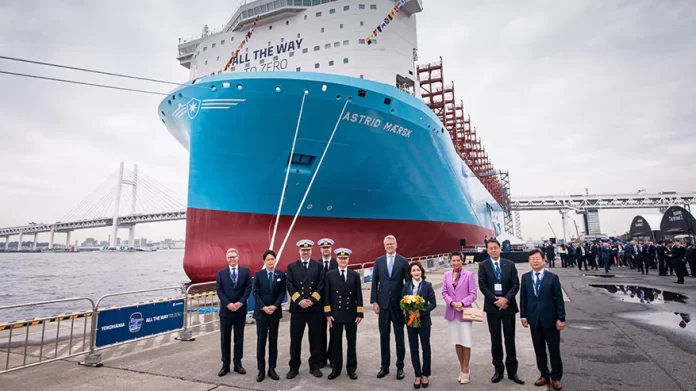In a ceremony conducted in Yokohama, Japan on 4 April 2024, the world’s second large methanol-enabled container ship was officially named “Astrid Maersk”.
The vessel marks the second installment in Maersk’s series of 18 large methanol-enabled vessels, slated for delivery between 2024 and 2025. This innovative fleet is poised to make a substantial contribution to the company’s net-zero targets and assist customers in their pursuit of decarbonization goals.
“We are truly excited to welcome ‘Astrid Maersk’ to our new fleet capable of sailing on green methanol. With this vessel and her sister vessels, Maersk is taking important steps on the journey towards the energy transition of ocean transport. No one can do this alone. To enable green supply chains and accelerate shipping’s move towards net-zero emissions, continuous courageous action by dedicated customers like Nissan, industry peers, and suppliers is essential. Importantly, to maintain momentum, there is a need for global regulations from the International Maritime Organization (IMO) to close the price gap between fossil and green fuels to secure a level playing field,” stated Vincent Clerc, CEO of A.P. Moller – Maersk.
The naming ceremony at the Daikoku Pier Cruise Terminal in Yokohama provided an opportunity for the public audience to register and embark on board for a vessel tour.
The Danish shipping company has committed to achieving a science-based Net-Zero greenhouse gas emissions target by 2040 throughout its entire business, alongside establishing ambitious near-term goals for 2030 to drive substantial progress. As part of this initiative, Maersk plans to outfit 25 of its container vessels with dual-fuel engines capable of running on green methanol.
In addition, notable vessels in this effort include the feeder vessel Laura Maersk, operational in the intra-Europe trade since September 2023, and “Ane Maersk”, a 16,000 TEU container vessel powered by green fuel, deployed in the Asia-Europe trade as of January 2024.
According to the statement, Maersk’s collaborative partnership with the City of Yokohama focusses on fostering the development of a green methanol bunkering infrastructure within Yokohama.







